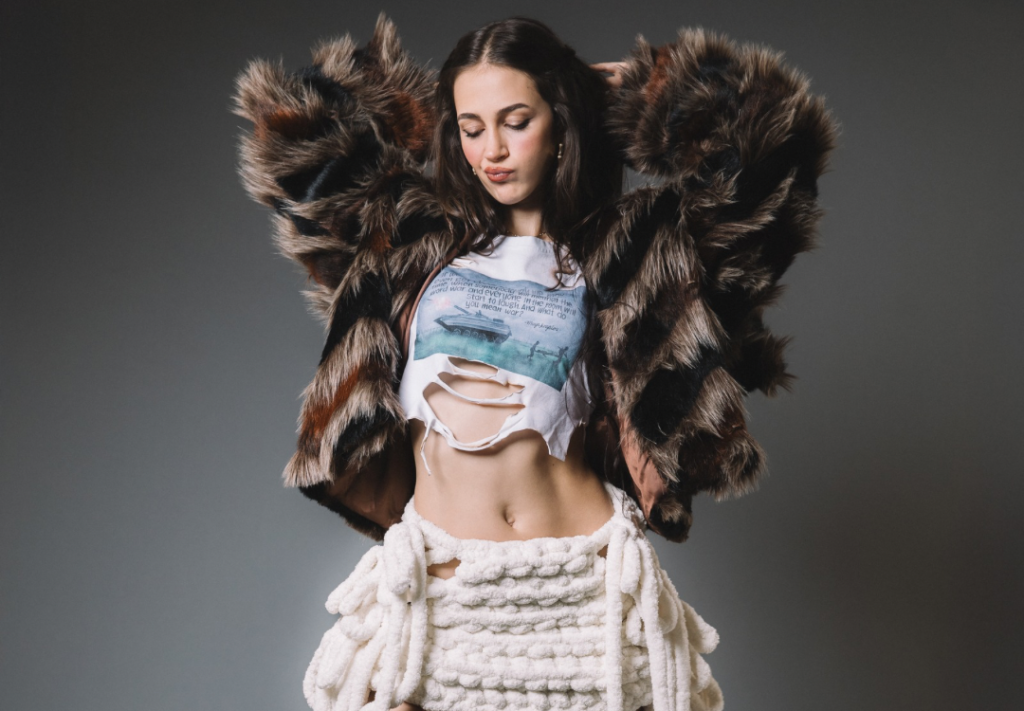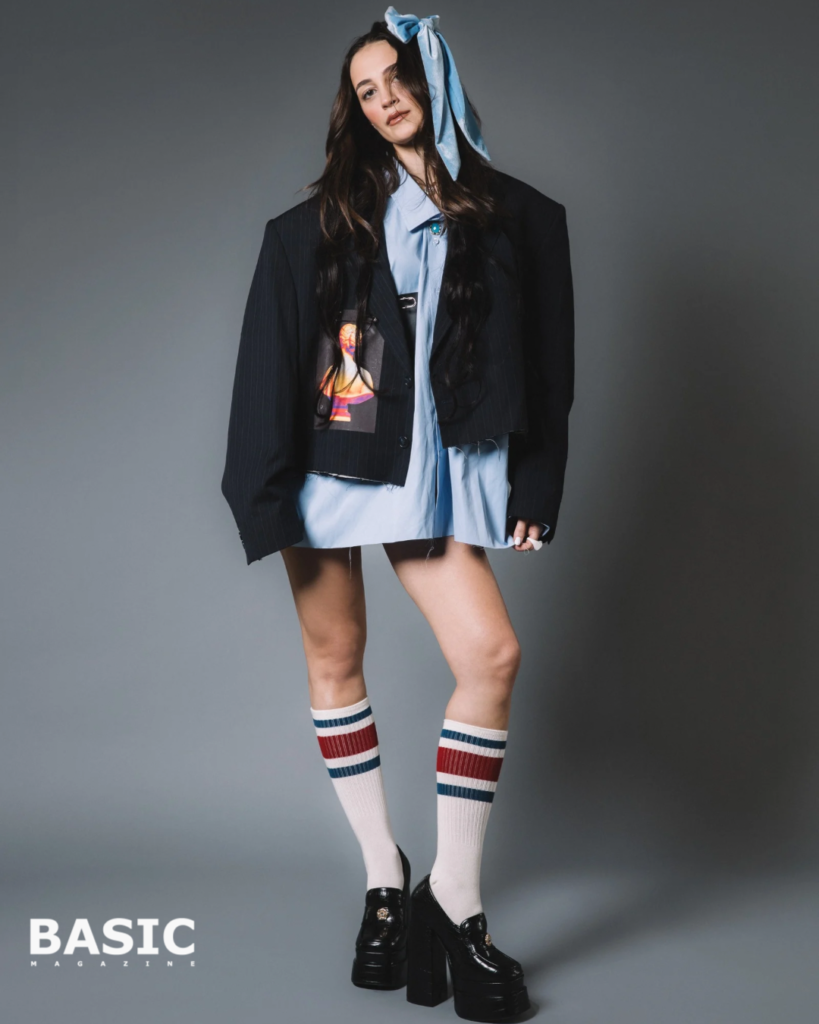
Shorts DIESEL @diesel
Shoes MARC JACOBS @marcjacobs
Photographer DYLAN PERLOT @dylanperlot
Stylist OTHTHAN OTHEEZY BURNSIDE @otheezystyledit
Makeup LUPE MORENO @lupemoreno_mua
Hair RAE CARABANTES @asapwigs
Production Coordinator CASSIDY COCKE @cassidy.ac
Stylist Assistant CAMILLE @okaymillie
Intern MADELEINE POEL @madeleine.m.p
Location ZEVARRA LOFTS @zevarralofts
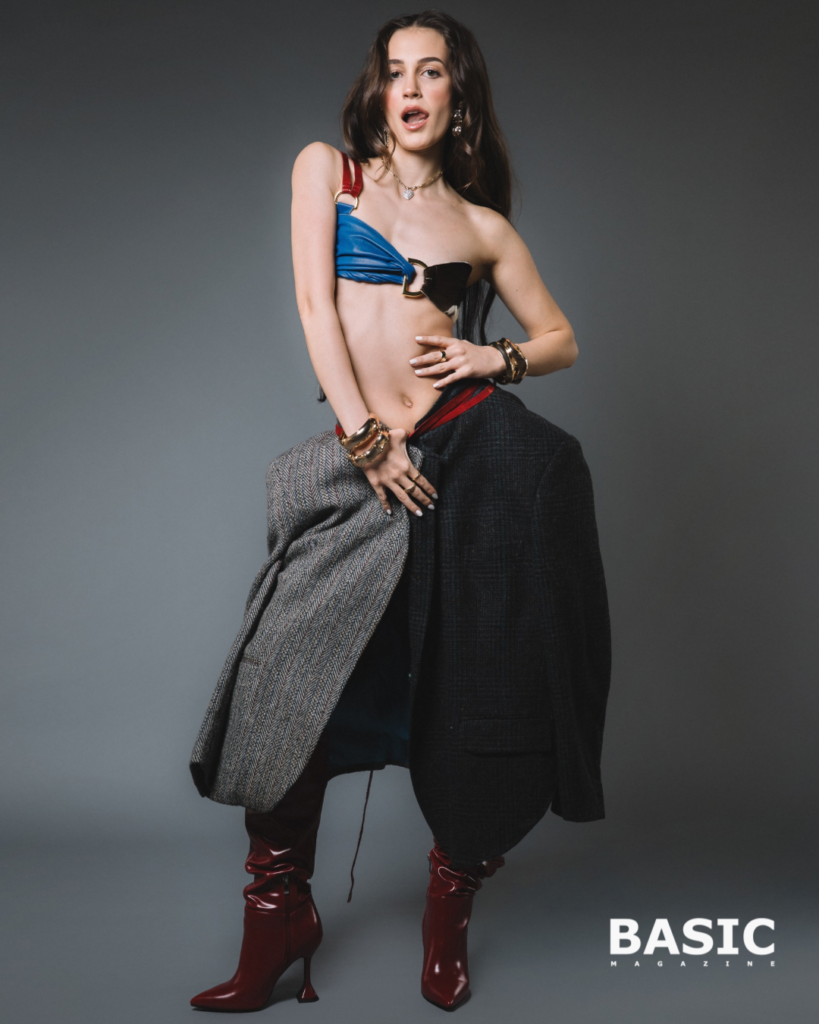
Skirt CORI BURNS @coriiburns
Boots AKIRA @shopakira
Words by Ryan Simón
Discussing dance-pop can sometimes be a challenge. What is the purpose of conversation when the music simply goes “untz untz” and the lyrics just go “yeah yeah”? However, this stereotype does not apply to INJI, a talented Turkish singer-songwriter who has consistently released chart-topping hits since gaining viral fame in 2022 with her unforgettable TikTok track, “GASLIGHT.” While you still get all the untz vibes you can ask for from an EDM track (INJI even has a song titled “UNTZ UNTZ”), the artist’s music brings depth to the genre, thanks to her unique gift for storytelling and wordplay. It’s just as enjoyable to read her lyrics as it is to dance to her songs. And as this interview reveals, INJI’s dance-pop is definitely worth discussing.
In preparation for another huge year ahead, INJI has new music in the pipeline, an EP scheduled for release in the spring, and an exciting lineup of music festivals planned for the summer. Following her meteoric rise over the past two years, she is ready to take on whatever lies ahead. Before diving into this new era of her career, we caught up with INJI to discuss her past, present, and future as a thriving artist.
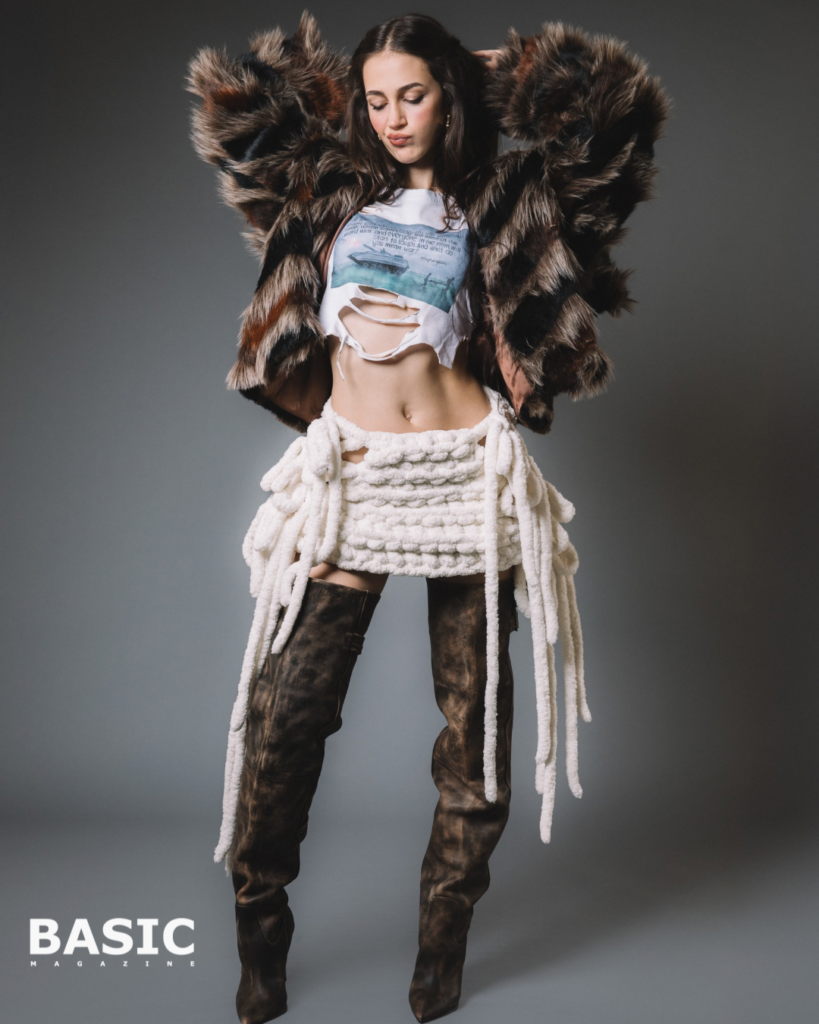
Skirt YOUSEFI @natalieyousefi
Fur CHARLES & RON @charlesandron
Boots STEVE MADDEN @stevemadden
Last year, you performed in Turkey as part of your world tour. How was the experience of sharing your new music in your own hometown?
It was kind of insane, especially because the entire project is in English. I started it in the U.S. and my social media is in English, so many people back home who first started discovering me didn’t realize that I was born and raised in Istanbul. Even in the audience, I could tell that people were shocked when I spoke Turkish. It felt like I was connecting two completely different worlds of my life, like a crossover episode. It was really fun and kind of bizarre to hear Turkish people singing my songs back to me in English. It was wild. I also played the show at a concert venue that I had been to many times since I was around 13 or 14 years old. It’s a very popular place for small artists to play in Turkey, so I had seen many other artists there before. But actually playing it was insane.
Were there any noticeable changes in atmosphere between countries on the tour? Do you find the need to adjust your performance to cater to different audiences at each venue?
Not so much in the places I’ve been to. This last tour wasn’t that large. I didn’t go to any random places. I’m only saying that because I’m going to Iowa for the first time this year and that might be a show where I will have to play for the audience. Maybe Iowa loves EDM, who knows! But going back to your question, I didn’t really have to change anything. I think the shows went pretty much the same. I did notice some vibe changes though. I could very obviously see that the famous party cities definitely loved to party at my show. For instance, London and San Francisco, even on a Tuesday night. [Laughs.] They were partying. Some cities were calmer, but you know, not that calm. I thought Hamburg was an old person city, but they came out. Hamburg was partying.
That sounds really fun. What’s your favorite song off your latest EP WE GOOD?
My favorite song is “SEXY 4EVER” because I had been building up that feeling so much and struggling with it for so long. Because my music is joyful and energetic, it’s kind of rare that I deal with anything serious, but that song really helped me. For context, the song is about my anxiety around aging and potentially getting boring or not being able to fit into the music industry. That day, when we were writing it, I just had to scream, “No! I refuse! I’m going to be sexy forever and ever and ever, and no one can stop me!” That song means a lot to me. It was really true to me.
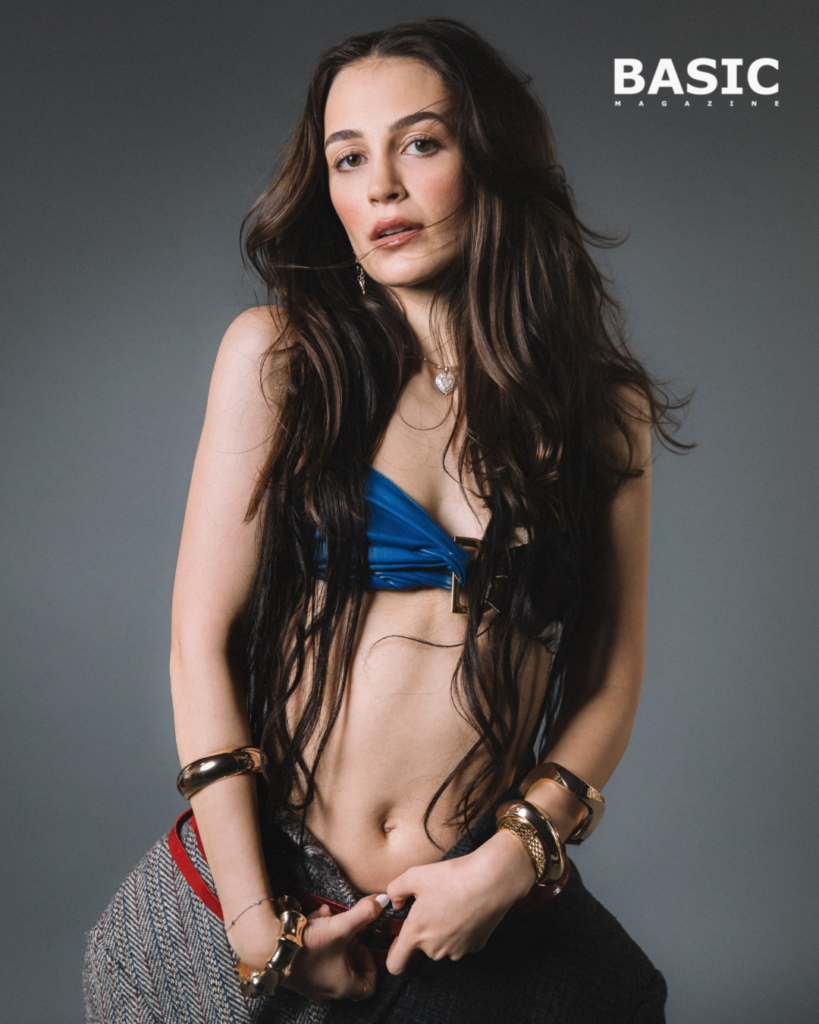
Skirt CORI BURNS @coriiburns
Boots AKIRA @shopakira
In an interview roughly a year ago, you named Nile Rodgers as your dream collaboration, which has come together on this EP with his appearance on “SEXY 4EVER.” Doubly poetic considering he’s still sexy at age 72. What was your experience like collaborating with Nile?
Oh my God, that’s exactly what I said when we sent him the song. We were like, “This song was made in heaven for you.” When I met him, the first thing I thought was, this man is 30 years old. He is 30. You cannot tell me he is any older than that. I think he also inspired the entire song, so having him on it was just legendary. I don’t even know how that happened. Working with him was entirely inspiring. When you’re at the beginning of your music career, there are a lot of very scary things to consider. One of them is wondering how everything will shape up when I’m older. Will I run out of things to say? Am I going to get tired of being on stage? Seeing someone like Nile Rodgers who, has completely changed the music industry and dance music, but is still not done, is so inspiring. He keeps making new music, finding young artists, and helping them out. It’s insane.
Your storytelling is unusually good for EDM music. Every time I hear “MADELINE,” where you vividly describe a chaotic night out with your friend Madeline, I am impressed by your talent. How do you approach translating personal moments into your lyrics, especially in tracks that narrate specific events like “MADELINE” or “GIRLZ”?
Thank you. Lyrics mean a lot to me. I don’t want to say I want to change dance music, but I want to change dance music. I think it’s a shame that dance music is classified as having the lyrics in the background or lyrics that always say the same thing or say nothing at all. When I first started making music, I saw this classification very much while working with other songwriters who would just try to make a generic dance song or while going through a dance playlist. I’d think, is anyone actually talking about something true to them? We can make stupid-we’re-drunk dance music, but I still want to say stuff. I still want to tell a story. I want the people listening to my music for the first time to wonder what I’m talking about, what I look like, or what I do in my real life. I want them to be interested in the person singing the song rather than seeing me as just a vocalist on a DJ track. I’m glad you like the storytelling. I try to keep it exciting. Lyrics are more important to me than the music of a song.
Amy Winehouse is often noted as one of your main influences. She had a talent for telling stories about what some might consider lowbrow or trashy subjects, but in a way that feels true to life and the human experience. I think that’s beautiful and I can see her influence on your lyricism.
I’ve been listening to Amy Winehouse since I was very young. One very remarkable thing about her songwriting is that as I get older, I’ll listen to one of her songs and understand five more double entendres. Hidden meanings. There are layers upon layers to her songwriting. Listening to her songs was the first time I truly enjoyed music on a deeper level. The lyrics were like reading a poem, but I was also listening to her beautiful voice. One hundred percent, she was the main influence that made me want to add meaning to my lyrics, to make them interesting and turn them into little playful games.
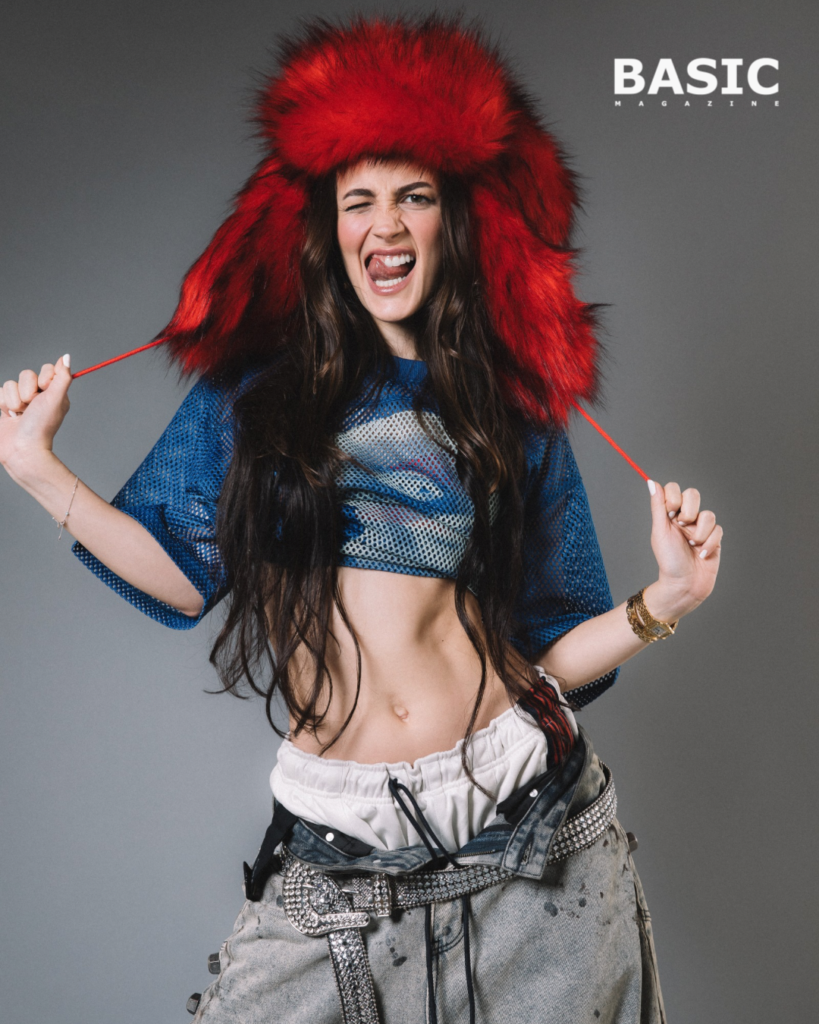
White Joggers URBAN OUTFITTERS @urbanoutfitters
Jeans LATUI ATELIER @latui.atelier
Red Fur Hat NAMILIA @_namilia_
Your visuals are also impressive, from the music videos, the cover photos, and the party clothes. Where do you pull inspiration?
I’m glad you say that because I think I have low talent in visual aesthetics. For my last project, I just got all of my friends together and said, “Hey, we’re shooting a video and everyone has to be in it.” In almost all of my music videos, the people you see next to me are my closest friends. The people shooting are my friends. We kind of do it all together. There’s a music video I shot at my school because I was in school at the time. There’s a music video I shot in my first apartment in New York City because that was the only place we had. For the visuals, I just brought my friends together to see what we could come up with. I do want to level up a bit in this new era with more amazing art and visuals, but I still want to keep it very natural. I was against labels putting together a music video for me.
When you make a song, where do you begin in the creative process?
It has always started with the music. I tried so many times to write before going into a session, but almost every single time, for the songs that I like and put out, if we hear the beat and the beat feels like something, then we write the hook. It’s always the hook first, and then we try to build around it. The songs I have put out have a pattern: they’re the most improvisational. Some songs that I hated during the session, where I couldn’t come up with anything, we just made stuff up, and they ended up being what we really liked. Sometimes you need to forget your expectations and almost give up on a song for it to be true and authentic.
How do you believe your background in music theory and classical piano as a child plays a role in your current sound and style of music-making?
First of all, that is what made me love music. As a little child, I’d play the piano and I felt things. It made me feel good. It taught me how to be expressive. When you’re playing classical piano, you’re not creating anything new. You’re playing what someone else wrote, so once you know how to play a piece, you can only add expression to it. It also made me confident in making stuff up because my brain is so used to notes—where notes sit and what melodies sound good. I also sang a little jazz in college and got used to scatting and improvising, which made me confident to go in a booth and freestyle melodies. If I didn’t have all those years of music experience, I would probably be bad at this.
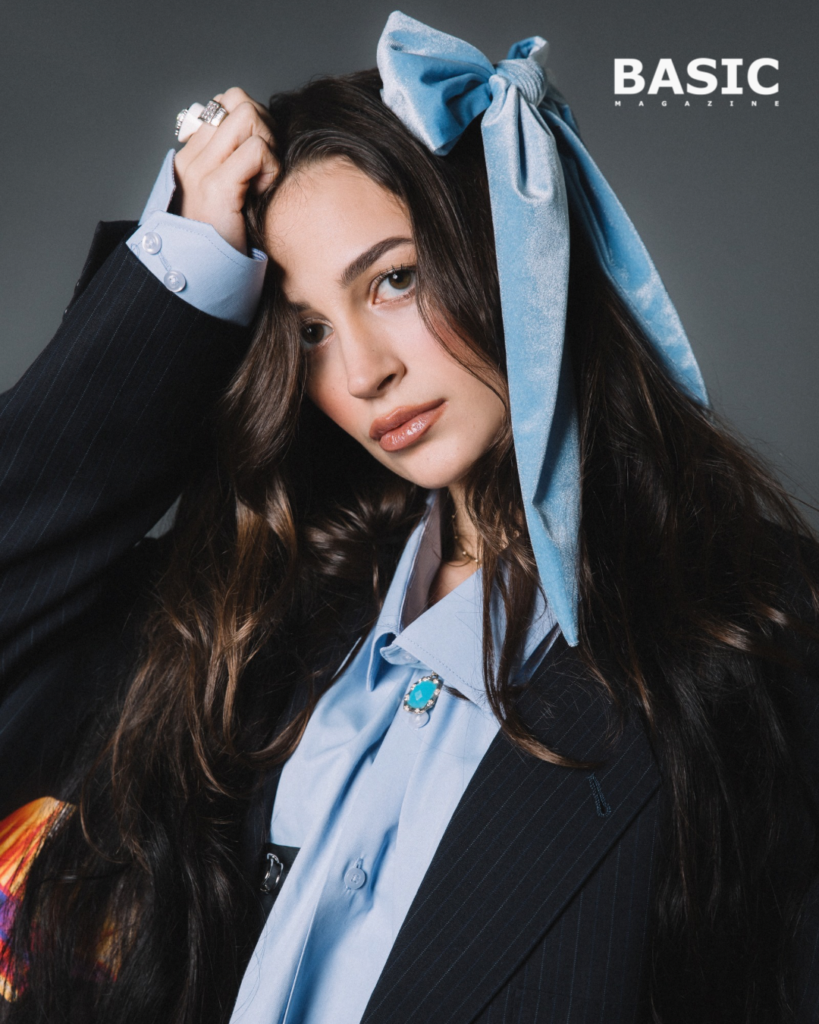
While “Gaslight” was going viral on TikTok, you were still attending the University of Pennsylvania. How did your peers at school respond to your sudden success? Did you notice any changes in the way your friends treated you?
It’s a really interesting story because there was no project. There was no artist name, no Spotify profile. I liked a boy, he was a songwriter, and we made a song. It came out of nowhere. It was so sudden. I didn’t even know what a label was. My friends’ reactions were adorable. Every frat started playing the song. When they played it, everybody at the frat party would sing along. It became a motif at our school, and it’s still continuing. I’ve been out of school for two years now, but I was in a sorority and they’re still playing the song and advertising it to recruit more people. No one’s behavior towards me changed at all. Sometimes before going out to parties, I had to look in the mirror and tell myself, “They’re going to make fun of you. They’re going to mention your TikTok. It’s okay! Don’t listen to them.” But nothing really changed. All of my friends were really sweet about being part of my music videos, and when I had a new song coming out, they’d debut it at their frat parties. It was a very supportive environment. I’m so glad this project started in college because I just had hundreds of people to celebrate it with.
At what point did you realize that you wanted to pursue music as a full-time career?
My first show. And, well, still to this day, I haven’t fully had that realization.
Really?
Yeah. I’m still scared. I think it’s my parents. They’re always saying, “So, how many more years are you going to try this before you start your career?” [Laughs.] I’m like, can they give me two more? But I think it struck me at my first show in New York, which was maybe my third show ever. I knew I just had to do this. I knew I couldn’t do anything other than music. This is the best thing I’ve ever experienced. There are people who are feeling happy because of something I made up. They want to jump around with me and they want to scream. It’s incredible. I think the first time I was on a stage, I realized I had to do this full-time, but “GASLIGHT” was a long time ago. I had another year of school to go through. I also had a job lined up. The only way I could tell my parents I wasn’t taking this job so I could do music instead, was to have some income. I’m not American, so America wouldn’t keep me if I didn’t have a job. It was a big deal. After “GASLIGHT” came out, I told myself I had to make this happen before I graduated, so that I can do music full-time. That was my goal all throughout the second half of college, and it happened! I’m very lucky.
Looking back on your progression from “Gaslight” to the present, what is the biggest lesson you have learned along the way?
It’s that anything good will be controversial. One of the hardest things I think is the first time you start seeing negative comments or hate. I had to learn that it’s still good. Anything interesting and good will get a lot of love and a lot of dislike. If it’s not creating any dislike, it’s probably not doing anything new or interesting. I had a phase where I was focused on making stuff that people would like, and I just made boring songs back-to-back. I was so stressed and thought I was being weird. The biggest lesson I’m still learning is that hate, or people disliking your work, is not something to be afraid of. If all that I’m thinking about is how to make people like me, I’m going to be forgotten.
“If all I’m thinking about is how to make people like me, I’m going to be forgotten.”
Do you remember the moment when you committed to that wisdom?
Super recently. About a year and a half after “GASLIGHT,” I had this song called “BELLYDANCING” that was pretty big in Turkey. I had my 15 minutes of fame moment, which also came with a bunch of random people who really hated me. That put me in this scared box of, oh no, these 60-year-old men from this corner of Instagram hate me! Then I started making bad art. I realized this it wasn’t working, that we have to commit to the hate.
You have another EP coming out and that you’ll be playing some massive festivals this summer. How are you feeling about everything?
Oh my God, I’m so scared. Well, one of the festivals is in Iowa. Hinterland. It will be fun. I’m playing some in Europe, like Lollapalooza Paris, which will be insane. I’m playing in Mexico for the first time. I only played one festival before, and that was Hangout. That was a very scary experience because people kind of just show up after you get on the stage to check you out and see what you’re about. It can be scary going from the comfort of your own tour, where every single person there willingly paid to come see me, to a festival. At a festival, it feels like you’re trying to please a bunch of random people. But I think it’s going to be incredibly fun.
What are you looking forward to the most in the near future?
I’m really looking forward to making my first album. Up until now, I’ve been making songs one by one. I’ve never really thought about a concept album. I’m very excited to make one big piece of art that lives on vinyl, something I’ll be really proud of, that physically exists. That’s something I’m looking forward to. Hopefully, I will like it, and hopefully you all will like it too.
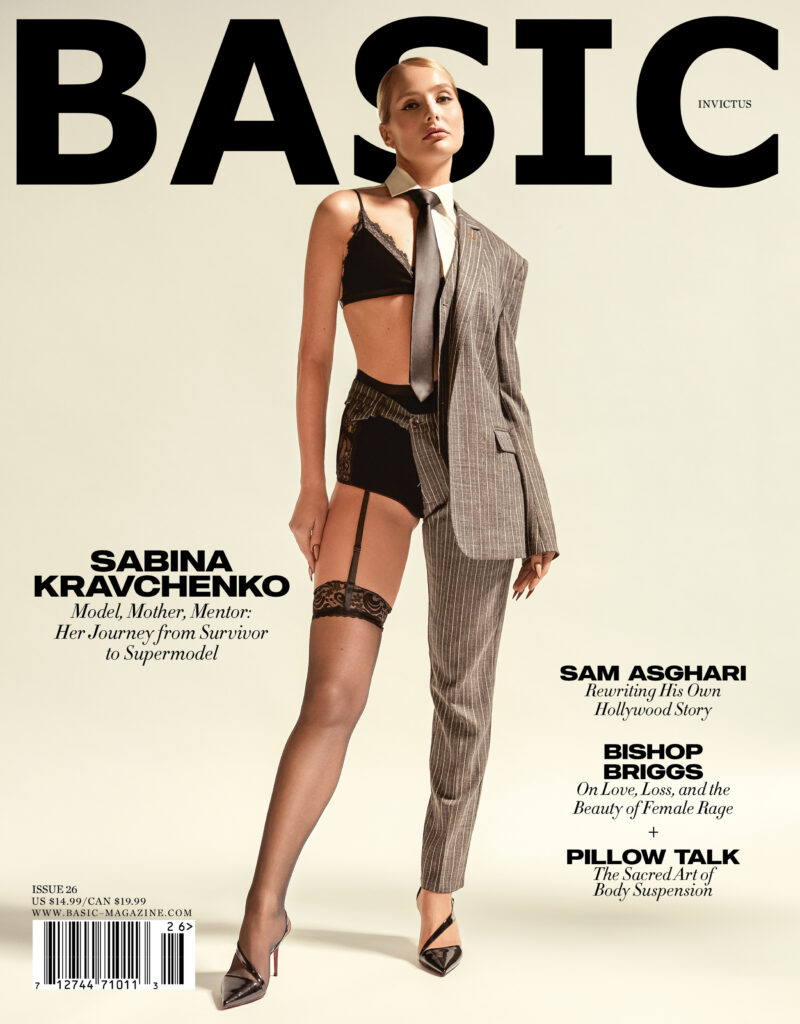
BUY ISSUE 26
You may also like
-
FIGHT TO THE OTHER SIDE: Hilary Roberts on Suffering, Freedom, and Sharing her Mafia Gifts
-
BREAKING BREAD with GAVIN ROSSDALE: A Conversation about Music, Food, and the Art of Hospitality
-
UNCOVERED: The Liberation of MODEL ROZ
-
BISHOP BRIGGS: Exploring Love, Loss and the Beauty of Female Rage
-
For the Love of the Game: SAM ASGHARI
-
HOW TO BE A STAR – A Conversation with Malachiii
